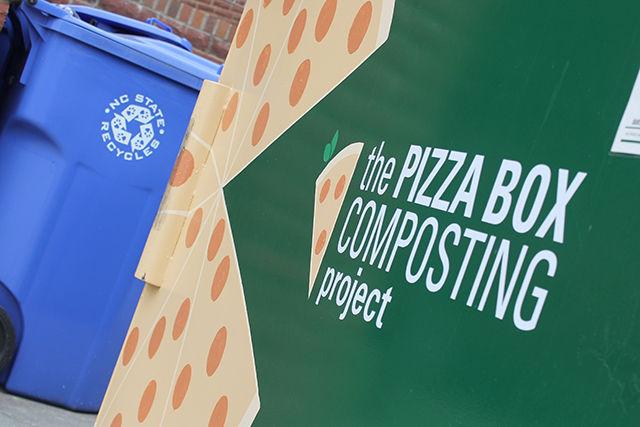Since its implementation this spring, the Pizza Box Composting Project created by NC State Waste Reduction and Recycling has composted about 3,789 pizza boxes to date and shows no signs of slowing down, according to Lauren McKinnis, the outreach coordinator for NC State Waste Reduction and Recycling.
Because of this new program, NC State now composts an average of 370 tons per year.
In 2010, University Dining found that 70 percent of the waste produced by Fountain Dining Hall was compostable, so University Dining began a composting initiative in the dining halls. Although the composting initiative has contributed to the sustainability program at NC State, it was mostly done without students’ knowledge.
The Pizza Box Composting Project was created not only as a way for NC State to divert waste from landfills and compost more, but also to get more students directly involved in composting.
“When we first began researching the idea for the Pizza Box Composting Project, we found that many colleges have similar composting centers and programs, but there were few colleges with specific sites for composting pizza boxes,” McKinnis said.
The composting centers, which are green dumpsters with the image of a pizza painted on the side, were originally placed only behind the Bragaw and Metcalf residence halls. The project has since expanded to include composting sites at the Avent Ferry complex, Wolf Village, Wolf Ridge and in Greek Village to bring the total number of composting sites to six.
“The project has been very successful,” McKinnis said.
Currently the program sends the pizza boxes to a private composter due to the difficulty in running an effective composting site. At this location the boxes are converted into usable compost.
Contaminants such as plastic utensils and cups cannot be composted. These items still often end up in the compost bins. For this reason, the bins and the University Housing website list what can and cannot be composted.
“Composting properly is not an easy task,” McKinnis said.
According to McKinnis, the future of the program seems bright. There has been a call for more composting sites to be placed around campus so even more students can begin composting their pizza boxes.
In addition to the Pizza Box Composting Project, the NC State dining halls have numerous programs that attempt to reduce waste and make the university more sustainable, such as the Pack & Go take-out program that allows students to utilize reusable plastic containers to take food from dining halls.
Since 2010, NC State has diverted 45 percent of its waste from landfills by recycling, reusing and composting. The Pizza Box Composting Project has helped increase this percentage of diverted waste.
McKinnis said there are many ways for students to get involved in the program, but the easiest way is to use the compost sites, rather than the dumpster, when throwing away pizza boxes, paper plates or napkins.
Austin Bowman, a sophomore in chemistry who lives in the EcoVillage located in Bragaw Residence Hall, said he helped with painting and placing the composting sites at the beginning of the project.
“Composting is something easy to do,” Bowman said. “You can’t recycle pizza boxes due to the leftover food often left inside, so the Pizza Box Composting Project was an easy way to see these boxes get used in a sustainable way.”
The Pizza Box Composting Project has given students the opportunity to take part in the composting that occurs at NC State.
McKinnis said the program shows no signs of slowing down and should continue to be successful in the future








